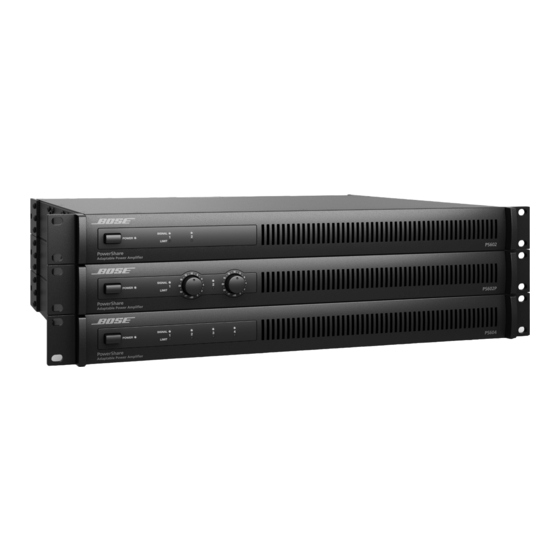- ページ 24
アンプ Bose PowerShare PS602PのPDF 設置および操作マニュアルをオンラインで閲覧またはダウンロードできます。Bose PowerShare PS602P 40 ページ。 Adaptable power amplifiers
Bose PowerShare PS602P にも: 設置および操作マニュアル (46 ページ), 設置および操作マニュアル (40 ページ)

Installation and Operation
Setting up the PowerShare Amplifier
The asymmetrical PowerShare capability of the amplifier is easy to use and does not require software to configure. Simply
set the output trims according to the power you want distributed to each output load, and the amplifier ensures that the
600 watts peak power is not exceeded. In scenarios where more power is demanded from the amplifier, the amplifier will
automatically limit all outputs equally until the power demand is reduced.
How to Set Up a PowerShare Amplifier:
1.
Starting with the amplifier power OFF, make all required power, audio, and control connections.
2.
For installations only requiring pre-loaded loudspeaker EQ:
• Set the CONFIG switch to REAR.
• Set the remaining amplifier configuration switches as necessary.
• Rotate each channel EQ dial to the required setting.
• Turn the amplifier ON.
3.
For installations that require advanced customization with the PowerShare Editor software:
• Set the CONFIG switch to SOFTWARE. The EQ dials are now ignored.
• Set the remaining amplifier configuration switches as necessary.
• Turn the amplifier ON.
• Connect the PC or laptop to the amplifiers' USB port.
• Start the PowerShare Editor software on your PC or laptop and configure each block as required for the
application. See the help file for details.
4.
If using CC-1 ControlCenter zone controller(s) for remote control, then rotate each amplifier output attenuator to 0 dB
attenuation, fully clockwise. This enables each CC-1 zone controller to attenuate over the full range. To have the CC-1
operate across a limited range, increase the output attenuation as needed by rotating the output attenuator counter-
clockwise.
5.
If all outputs are set to drive 70/100V Hi-Z loudspeakers then rotate each corresponding output attenuator to 0 dB
attenuation. Set each loudspeaker tap to the appropriate setting. Based on the total loudspeaker tap settings the
amplifier will adapt and deliver the required power to each output. The 600 watts of available power can be distributed
in any way across all amplifier outputs. For examples see the PowerShare Application Guide.
6.
If all outputs are set to drive 4–8 Ω Low-Z loudspeakers then rotate each output attenuator until the desired level is
reached from each output. Play a signal containing the highest normal input level or pink noise. Ensure the material
is near the input sensitivity for best noise performance. Observe the limit LED for the output being adjusted. If the
signal level is higher than the protection limit for the loudspeaker, you will see the limit LED light amber. Increase the
attenuation until the limit LED does not light, or only occasionally lights. The 600 watts of available power can be
distributed in any way across all amplifier outputs. For examples see the PowerShare Application Guide.
7.
Since each output is configurable to drive either Hi-Z or Low-Z loudspeakers, the amplifier can support mixed-
impedance installations. In this case, first configure the Hi-Z channels before configuring the Low-Z channels.
8.
When setting up the amplifier, monitor the signal LEDs for input clipping and the limit LEDs for output limiting to
ensure the amplifier is working within proper operating conditions. If necessary, make adjustments.
Technical Considerations:
• When a loudspeaker EQ is selected, either from the rear panel dials or in the software, the appropriate crossover and
Vpeak and Vrms limiters for that loudspeaker are automatically loaded. They can be adjusted in software if necessary.
• Adjusting the attenuator of a single channel does not affect the level of other channels. The only exception is if the
amplifier is attempting to deliver more than 600 watts total power. If the total amplifier power is exceeded then the
amplifier will limit all outputs simultaneously and equally, until the demand is reduced. If the demand remains too high,
the amplifier will gradually limit to an average of 1/3rd power (200 watts) continuously.
• There are five ways to adjust output power in a PowerShare amplifier application:
• Adjust input signal level relative to the sensitivity setting of the amplifier.
• Adjust the output attenuator settings of the amplifier.
• Adjust the CC-1 ControlCenter zone controller(s) settings.
• Adjust the limiter settings for each output using the PowerShare Editor software.
• Adjust the transformer tap settings of any connected Hi-Z loudspeakers.
24 English
pro.Bose.com
Installation Guide
